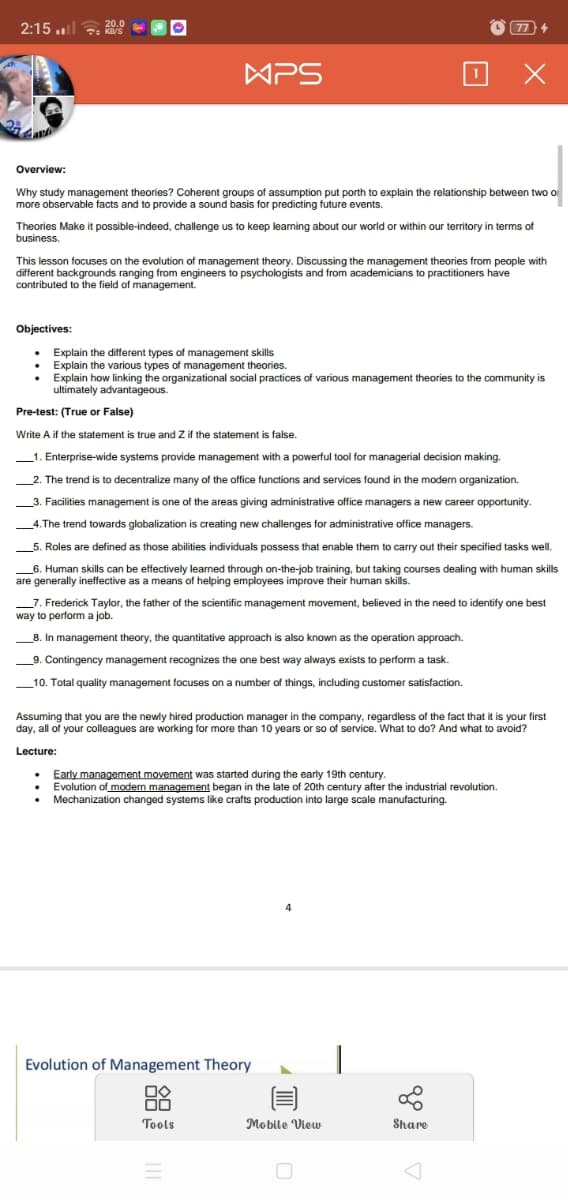Overview: Why study management theories? Coherent groups of assumption put porth to explain the relationship between two o more observable facts and to provide a sound basis for predicting future events. Theories Make it possible-indeed, challenge us to keep learning about our world or within our territory in terms of business. This lesson focuses on the evolution of management theory. Discussing the management theories from people with different backgrounds ranging from engineers to psychologists and from academicians to practitioners have contributed to the field of management. Objectives: Explain the different types of management skils Explain the various types of management theories. • Explain how linking the organizational social practices of various management theories to the community is ultimately advantageous. Pre-test: (True or False) Write A if the statement is true and Z if the statement is false. _1. Enterprise-wide systems provide management with a powerful tool for managerial decision making. 2. The trend is to decentralize many of the office functions and services found in the modern organization. _3. Facilities management is one of the areas giving administrative office managers a new career opportunity.
Overview: Why study management theories? Coherent groups of assumption put porth to explain the relationship between two o more observable facts and to provide a sound basis for predicting future events. Theories Make it possible-indeed, challenge us to keep learning about our world or within our territory in terms of business. This lesson focuses on the evolution of management theory. Discussing the management theories from people with different backgrounds ranging from engineers to psychologists and from academicians to practitioners have contributed to the field of management. Objectives: Explain the different types of management skils Explain the various types of management theories. • Explain how linking the organizational social practices of various management theories to the community is ultimately advantageous. Pre-test: (True or False) Write A if the statement is true and Z if the statement is false. _1. Enterprise-wide systems provide management with a powerful tool for managerial decision making. 2. The trend is to decentralize many of the office functions and services found in the modern organization. _3. Facilities management is one of the areas giving administrative office managers a new career opportunity.
Management, Loose-Leaf Version
13th Edition
ISBN:9781305969308
Author:Richard L. Daft
Publisher:Richard L. Daft
Chapter7: Planning And Goal Setting
Section: Chapter Questions
Problem 2ED
Related questions
Question

Transcribed Image Text:2:15 .
20.0
KB/S
O 774
WPS
Overview:
Why study management theories? Coherent groups of assumption put porth to explain the relationship between two o
more observable facts and to provide a sound basis for predicting future events.
Theories Make it possible-indeed, challenge us to keep learning about our world or within our territory in terms of
business.
This lesson focuses on the evolution of management theory. Discussing the management theories from people with
different backgrounds ranging from engineers to psychologists and from academicians to practitioners have
contributed to the field of management.
Objectives:
Explain the different types of management skills
Explain the various types of management theories.
Explain how linking the organizational social practices of various management theories to the community is
ultimately advantageous.
Pre-test: (True or False)
Write A if the statement is true and Z if the statement is false.
1. Enterprise-wide systems provide management with a powerful tool for managerial decision making.
2. The trend is to decentralize many of the office functions and services found in the modern organization.
_3. Facilities management is one of the areas giving administrative office managers a new career opportunity.
4.The trend towards globalization is creating new challenges for administrative office managers.
5. Roles are defined as those abilities individuals possess that enable them to carry out their specified tasks well.
6. Human skills can be effectively learned through on-the-job training, but taking courses dealing with human skills
are generally ineffective as a means of helping employees improve their human skills.
7. Frederick Taylor, the father of the scientific management movement, believed in the need to identify one best
way to perform a job.
_8. In management theory, the quantitative approach is also known as the operation approach.
_9. Contingency management recognizes the one best way always exists to perform a task.
10. Total quality management focuses on a number of things, including customer satisfaction.
Assuming that you are the newly hired production manager in the company, regardless of the fact that it is your first
day, all of your colleagues are working for more than 10 years or so of service. What to do? And what to avoid?
Lecture:
Early management movement was started during the early 19th century.
Evolution of modern management began in the late of 20th century after the industrial revolution.
Mechanization changed systems like crafts production into large scale manufacturing.
Evolution of Management Theory
Tools
Mobile View
Share
Expert Solution
This question has been solved!
Explore an expertly crafted, step-by-step solution for a thorough understanding of key concepts.
Step by step
Solved in 2 steps

Recommended textbooks for you

Management, Loose-Leaf Version
Management
ISBN:
9781305969308
Author:
Richard L. Daft
Publisher:
South-Western College Pub

Management, Loose-Leaf Version
Management
ISBN:
9781305969308
Author:
Richard L. Daft
Publisher:
South-Western College Pub